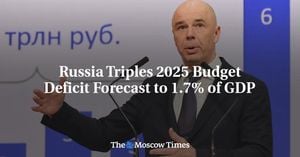On May 1, 2025, the latest episode of 'Bar Goens' showcased a colorful array of guests, including actor Mathias Vergels, who recently announced his departure from his long-standing role as Lowie Bomans in the popular series 'Thuis'. Vergels, who has captivated audiences for 13 years, shared the stage with Ria and Eugene, a couple facing a hefty water bill from De Watergroep, which notably did not attend the discussion due to prior birthday plans. The episode also featured Jessica Rul, known in the adult film industry as Gigi Max, who was recently crowned 'Best Belgian Performer' and will be appearing in the upcoming Streamz reality series 'Mama’s maken porno'.
Later in the episode, Tom Van Grieken, chairman of the far-right Vlaams Belang party, took a seat to discuss the significance of May 1st and to settle scores from previous political debates. Qmusic presenter Bert De Kock rounded out the guest list, answering questions posed by sidekick Charlotte Sieben after a performance by Team Belgium’s cheerleaders, who had recently won gold at the world championships in Orlando.
One of the more poignant moments of the show came when Vergels reflected on his past struggles with drug addiction, referencing a segment from 'Het Huis' recorded a year and a half ago. The conversation with Van Grieken served as a follow-up to a previous political discussion from 'Het Conclaaf', where tensions had run high. Both men appeared eager to revisit their past exchanges, underscoring the ongoing political discourse.
While the episode aimed to address pressing issues, such as the couple's ongoing battle with De Watergroep over their exorbitant water bill and the complications surrounding their digital meter, viewers were surprised to learn that their issues had been resolved just a day prior to the broadcast. Ria had meticulously documented every drop of water used, even detailing that she utilized precisely two liters to cook her asparagus, an anecdote that highlighted her commitment to tracking their consumption.
However, the episode did not escape criticism. Observers noted a lack of engagement with current events, with Goens, the host, seemingly more focused on light banter than serious discussion. The conversation felt at times disjointed, with Vergels even losing track of his thoughts mid-sentence, a moment that viewers found both awkward and relatable. As Vergels attempted to steer the conversation back to his bachelor party, it became clear that the show struggled to maintain a cohesive narrative.
The humor throughout the episode received mixed reviews, with some finding it cringeworthy, particularly when Goens made light of Van Grieken's political stance. The episode's attempts at humor fell flat, especially when it came to the discussions around the serious implications of the political issues at hand.
In contrast, the second episode of 'Bar Goens' highlighted the fierce competition in the talk show arena, as it managed to draw viewers away from 'De tafel van Tine'. According to CIM data, the debut episode of 'Bar Goens' attracted 219,631 viewers, climbing to 226,897 on its second night. This marked a notable shift, as 'De tafel van Tine' lost 68,000 viewers, dropping from 227,037 to 158,765 within the same timeframe.
Amidst this talk show war, 'De afspraak' on VRT Canvas held the title for the largest audience on Monday, with 237,747 viewers, though it too faced a decline on Tuesday, garnering only 220,846 viewers. The shift in viewer preference indicates a growing interest in Goens’ approach and style, which some viewers found refreshing compared to the more established formats.
As the talk show landscape evolves, the question remains: is there enough content and variety to sustain three competing shows? Early indications suggest that viewers may be gravitating towards new formats and voices, as evidenced by the immediate impact of 'Bar Goens' on its competitors.
Ultimately, while the current episode of 'Bar Goens' may have had its flaws, it represents a significant shift in the talk show landscape, challenging the status quo and inviting viewers to engage with a broader spectrum of topics and personalities. The ongoing competition among these shows will likely continue to shape the content and direction of Flemish television in the months to come.




